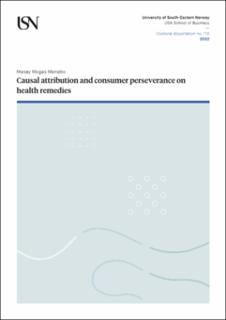Causal attribution and consumer perseverance on health remedies
Doctoral thesis
Published version
Permanent lenke
https://hdl.handle.net/11250/2833387Utgivelsesdato
2022Metadata
Vis full innførselSamlinger
Sammendrag
Some alternative remedies have been proven to be pharmacologically ineffective and therefore unable to heal any illness and are a burden to publicly funded health insurance. Nevertheless, the market for such remedies is steadily growing and is predicted to reach a global market size of around USD 404 billion by 2028, posing a global health burden. A vast amount of literature has explored why people initiate use of alternative remedies. However, not so much on why maintain use. Counterintuitive to elementary knowledge about consumer behavior, case reports have indicated that some alternative remedy users persevere with a product even when the illness it is intended to treat is not overcome. This seemingly results from causal attribution bias, in which users attribute the cause of non-recovery more to themselves than to the product. In this dissertation, I documented evidence of this counterintuitive form of causal attribution as well as the propensity on the part of consumers to persevere with a failed remedy. Moreover, I explored the predictors of individuals’ susceptibility to such behavior and investigated the consequences with respect to consumption variables relevant to marketing management.
The results from empirical investigation confirmed that the tendency for susceptibility to causal attribution bias differs depending on how much a remedy emphasizes mind–body integration and to what extent users of a remedy embrace this ideology. It was documented that alternative users tend to persevere for a longer (vs. a shorter) number of days with alternative (vs. conventional) remedies until they give up and conclude that it does not work even after knowing that the illness was not initially overcome. Moreover, it was shown that alternative remedies are in general less evaluable than conventional remedies. Such a feature of low evaluability caused less attribution of failure to the product and made participants persevere longer with an unsuccessful therapy but also resulted in significantly higher levels of WTP. Furthermore, this effect increased with an increase in an individual’s BPI level, a dispositional belief trait held by every individual to a greater or lesser extent. The research’s findings advance the literature on product loyalty and causal attribution. Managerial wise, the findings help health authorities in their campaign against the proliferation of ineffective health practices by identifying the attribute of the remedy that causes it and/or distinguishing personality of victims that are most susceptible.

